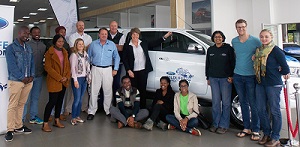All news
Life Sciences Research Benefits from Ford Wildlife Foundation Research Vehicle
2018/02/08 04:02:58 PM
Professor Colleen Downs, from the School of Life Sciences, Pietermaritzburg, and her research team received a Ford Ranger from the Ford Wildlife Foundation (FWF) in December 2017.
 Professor Colleen Downs, from the School of Life Sciences, Pietermaritzburg, and her research team received a Ford Ranger from the Ford Wildlife Foundation (FWF) in December 2017. The research vehicle will support their research on a number of topics related to terrestrial vertebrates, changing land use and more.
Professor Colleen Downs, from the School of Life Sciences, Pietermaritzburg, and her research team received a Ford Ranger from the Ford Wildlife Foundation (FWF) in December 2017. The research vehicle will support their research on a number of topics related to terrestrial vertebrates, changing land use and more.
Downs is also the SARChl Research Chair in Ecosystem health and biodiversity in KwaZulu-Natal and the Eastern Cape.
The Ford Ranger 4x4, one of 11 donated to eight partner organisations in 2017, was handed over at Halfway Ford in Waterfall in December 2017 at an event attended by Downs and a group of her students, as well as FWF representatives. According to a statement from the FWF, the handover forms part of Ford Motor Company of Southern Africa’s (FMCSA) commitment to the conservation and preservation of the environment in sub-Saharan Africa.
The FWF was established by the FMCSA in 2014, equipping partner organisations with Ford Rangers to enable their conservation efforts. The vehicles are maintained by the Ford Dealer network to ensure that they operate at peak efficiency.
Researchers will utilise the vehicle in their investigations of the impacts of changing land use, including urbanisation, on biodiversity, particularly herps, birds and mammals. One of the projects Downs’ team is focusing on is vultures as they are under threat across Africa due to anthropogenic change. Among vultures, 61% appear on the Red List of Threatened Species and conservation remains challenging as vultures are relatively long-lived with low reproductive rates. The research includes species movement, local attitudes, and the effect of land use. Their work will aid in understanding how these and other species persist with anthropogenic change, and continue to contribute to conservation, management and public awareness.
‘We’re really proud to be associated with all of you who everyday go out and actually make a difference in our world by looking at how we can further conservation and education,’ said Ms Linda du Plessis of the FWF as she wished the researchers well in their various projects.
The locally built, top selling vehicle handed over to Downs and her team is being used to enable projects to go further and make a real impact – particularly in the remote locations often associated with conservation and environmental projects. The vehicle is capable of traversing dirt, gravel, and the kinds of terrain found in South Africa’s natural parks and protected areas where this research is taking place.
‘The use of the Ford Ranger is a major contributor to our work and our postgraduates being able to successfully undertake the research, as travel is one of the biggest constraints,’ said Downs.
Downs’ research in these fields has been going on for the past 10 years, receiving impetus with Downs’ appointment as a SARChI Chair. Downs and her students travel extensively to field sites in the Eastern Cape, KwaZulu-Natal, Mpumalanga, and Limpopo provinces.
Words and photograph: Christine Cuénod










